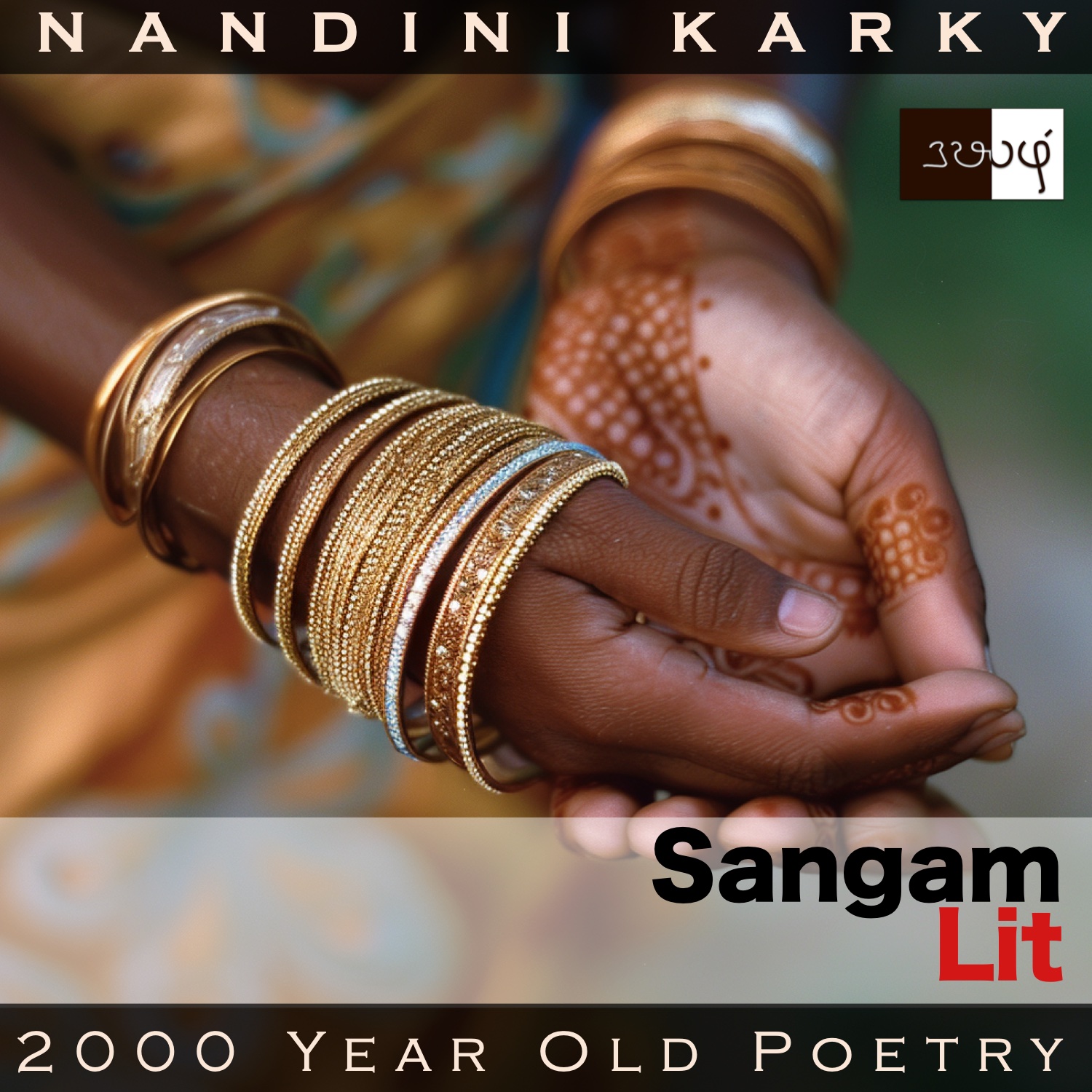Podcast: Play in new window | Download
Subscribe: Apple Podcasts | Spotify | Amazon Music | Android | iHeartRadio | TuneIn | RSS | More
In this episode, we listen to a philosophical thought about the heart, as portrayed in Sangam Literary work, Kalithogai 125, penned by Nallanthuvanaar. The verse is situated in the ‘Neythal’ or ‘Coastal Landscape’ and puts forth a heartfelt plea.

‘கண்டவர் இல்’ என, உலகத்துள் உணராதார்,
தங்காது தகைவு இன்றித் தாம் செய்யும் வினைகளுள்,
நெஞ்சு அறிந்த கொடியவை மறைப்பினும், ‘அறிபவர்
நெஞ்சத்துக் குறுகிய கரி இல்லை ஆகலின்,’
வண் பரி நவின்ற வய மான் செல்வ!
நன்கு அதை அறியினும், நயன் இல்லா நாட்டத்தால்,
‘அன்பு இலை’ என வந்து கழறுவல்; ஐய! கேள்:
மகிழ் செய் தேமொழித் தொய்யில் சூழ் இள முலை
முகிழ் செய முள்கிய தொடர்பு, அவள் உண்கண்
அவிழ் பனி உறைப்பவும், நல்காது விடுவாய்!
இமிழ் திரைக் கொண்க! கொடியைகாண் நீ
இலங்கு ஏர் எல் வளை ஏர் தழை தைஇ,
நலம் செல நல்கிய தொடர்பு, அவள் சாஅய்ப்
புலந்து அழ, புல்லாது விடுவாய்!
இலங்கு நீர்ச் சேர்ப்ப! கொடியைகாண் நீ
இன் மணிச் சிலம்பின் சில் மொழி ஐம்பால்
பின்னொடு கெழீஇய தட அரவு அல்குல்
நுண் வரி வாட, வாராது விடுவாய்!
தண்ணந் துறைவ! தகாஅய்காண் நீ
என ஆங்கு
அனையள் என்று, அளிமதி, பெரும! நின் இன்று
இறை வரை நில்லா வளையள் இவட்கு, இனிப்
பிறை ஏர் சுடர் நுதற் பசலை
மறையச் செல்லும், நீ மணந்தனை விடினே.
On behalf of a friend again! The words can be translated as follows:
“Thinking, ‘there’s no one to see what we are doing’, some ignorant people in the world may do certain things, without remaining in the right path and without having anyone to stop them. They would then try to hide the evil they have done. They should know that there can be no greater witness than their heart, which knows everything, O man who owns many strong and skilled horses! Even though I know this very well, because of your actions, which lack grace, I have come here to rebuke you, saying ‘You have no love!’ O lord, listen:
Back then, your bond with her made the young bosoms of that maiden, with joyous words, akin to honey, bloom. But now making her kohl-streaked eyes blossom with tears, you have forsaken her, without rendering your grace, O lord of the resounding waves! Terrible, you are!
Back then, your bond with her made the beauty of the maiden wearing radiant, glowing fine bangles, flourish, when you adorned her with a leaf attire. But now making her lament and cry, you have forsaken her, without rendering your embrace, O lord of the shining waters! Terrible, you are!
Back then, your bond with her made you hold close the maiden of few words, having thick tresses and wearing anklets with sweet-sounding bells. But now making the fine lines on her snake-hooded loins fade, you have forsaken her, without rendering your presence, O lord of the cool shores! Terrible, you are!
And so, understanding that she is in such a state, you render your grace, O lord! Without you, her bangles stay not on her wrists. The pallor that hides her glowing, crescent-moon forehead now, would vanish away forever, if only you would marry her!”
Time to delve into the nuances. The verse is situated in the context of a man’s parting from a lady, prior to marriage, and here, the confidante presents her case to the man. She starts in an abstract fashion, talking about how even though people may do certain things thinking that nobody is watching them, their hearts know it and can bear the best witness. Even though she knows this truth, the confidante says she has come to state the man’s mistake openly to him. She goes on to talk about how the man made the beauty of the lady glow by being with her, by giving her the gift of leaf attires and by embracing her. But later, he left her, and because of that, the same beauty he had endowed had now waned, making the lady shed tears. The confidante calls the man a heartless person. After scolding him so, the confidante concludes by saying how the lady’s bangles never stay on her wrists, when the man is away, and if only he graces her by marrying her, the pallor on her fine forehead would be banished forever!
Felt somewhat disheartened by yet another portrayal of the Sangam woman as a person, utterly dependant on her man. Looking at the past with these modern eyes, I can’t help wishing that the women then were presented as individuals, who could stand and flourish on their own. What could be the purpose in projecting women in this frail manner? At the same time, seeing from a different angle, I feel so much joy and pride about women, who have risen from such notions about them in many, many parts of the world, to conquer the world and beyond!




Share your thoughts...